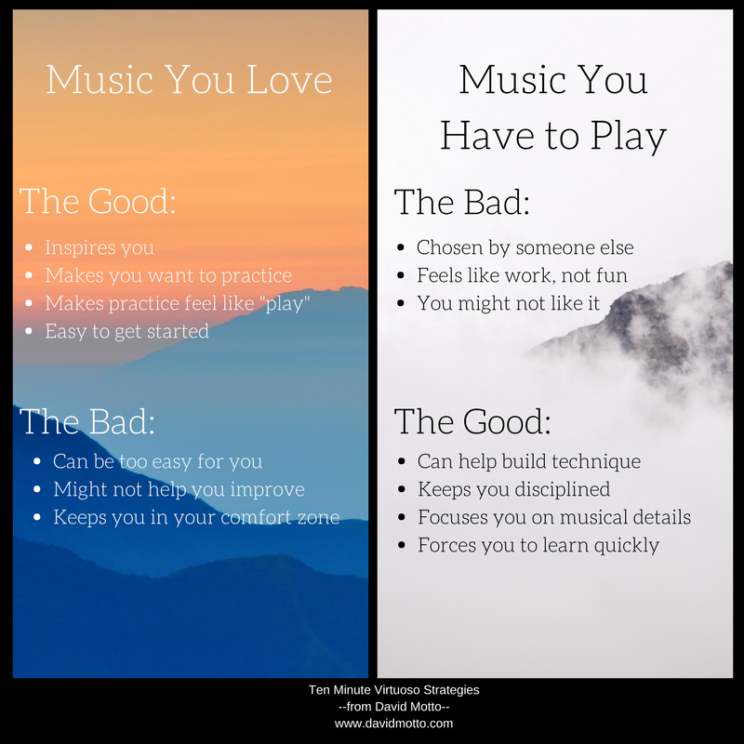David Motto’s Practice Tip of the Week:
Music You Love vs. Music You Have to Learn
Inspiration and Play
Being inspired by the music you are mastering is the ultimate motivational tool for practicing.
Music you love will put the focus back on the “play” in playing an instrument. Practicing will seem automatic, time in the practice room will fly by, and you will pay attention to every detail of the music.
I’m for doing anything and everything possible to stay inspired and motivated in the practice room, so I highly recommend you work on songs that you love. Sounds like the perfect way to play music, right?
There’s just one problem with this strategy:
You don’t always get to choose the music you’re learning. How do you stay inspired and motivated when working on music you have to learn?
Music You Don’t Choose Yourself
There are many times when you won’t be able to choose material yourself:
- You’re taking lessons and your teacher chooses the songs.
- That same teacher recommends – or even assigns – drills, scales, studies, and exercises.
- You’re in a group and many people are involved with picking songs.
- You’ve been hired for a gig and have no say in what music gets played.
- You have an audition or competition coming up, and the song list is given to you.
You may feel neutral about the songs. You may hate the songs. The songs could have really hard sections that will take a lot of work to master.
No matter what the case, you’ll want to find something inspiring – not in the music itself, but something that inspires you on your quest for music mastery.
Finding Inspiration in the Details
Here are three ideas for staying inspired and motivated when you’ve got to practice music you don’t really like:
1. Focus on Your Technique: Instead of focusing on the song itself, keep your focus on playing perfectly and learning new techniques. Look at the smallest details, pick them apart, and totally own them! It’s actually pretty easy to get through unappealing music when all you’re thinking about is getting better at your craft.
2. Make a Game Out of It: See how quickly you can learn the tough sections by timing yourself. Or, play something fun once you get 10 repetitions right in the song you can’t stand. There’s always a way to make a game out of practicing!
3. Challenge Yourself to Play Your Absolute Best: Pretend that the song you don’t like is the world’s best song and needs to be presented to the world successfully. Come up with ways to sound great, even in your least favorite parts. I had to do this once for an entire week of recording sessions to complete a songwriter’s album. I disliked the material, but gave my all (as did the other hired-gun musicians) so that the performance was really good. The songs may have been weak, but the band sounded really good.
Keep a Balance
When you have control over choosing which songs to learn, choose songs that speak to you, that you truly like, and that you sincerely want to learn. These songs are the reason you were drawn to play music in the first place!
Just realize that your favorite songs may not actually make you a better musician. If you’re not getting outside your comfort zone, it’s unlikely you’ll improve your technique and musicianship.
When songs are chosen for you, make the best of it and find the hidden gems inside the music that will allow you to stay interested and inspired.
And, if you find yourself in the situation where you’ve got a lot of music you don’t like that you have to learn quickly, end each practice session with some music that truly inspires you as your reward.
To Your Musical Success!
David Motto


Judy, you are very welcome! Glad to hear that your students are getting some positive value from my Practice Tips of the Week. Please share my tips with all the musicians you know.
Great advice, Rick. Interleaving practice is definitely the way to go. Not only is it more fun, but it’s also more effective than doing endless repetitions. You can do just a few reps, move on to other material, then circle back and do some more reps. Keep me posted on how this is all working for you.
A timely topic for me. I find my enthusiasm flagging when I’m in the middle of learning a challenging piece. At the beginning it’s fun, I’m learning something brand new. At the end it sounds great and I feel an accomplishment. In the middle I get bored as the reps drag on.
This month I am trying a sort of variation of item 2 “make it fun.” I call it focus on the process. I use interleaved practice, starting from back to front, or 5 or 10 repetitions of small sections played without error and increasing tempo gradually. This gets me through the boredom to get to improvement quicker
I should have written to you long before now. Your tips have been very helpful and encouraging. My students have definitely benefited from your advice and help.
Thank you very much for offering this wonderful gift to us!